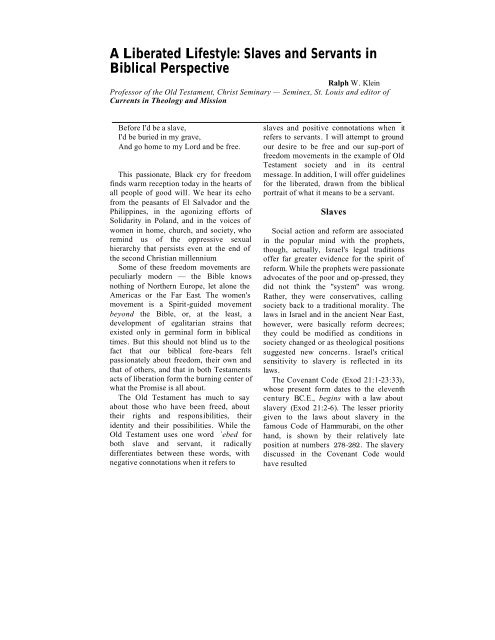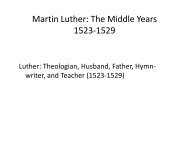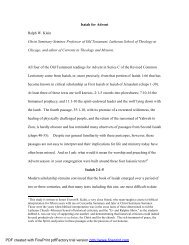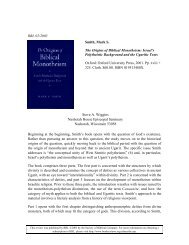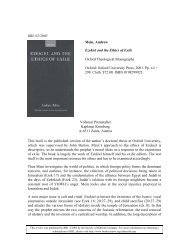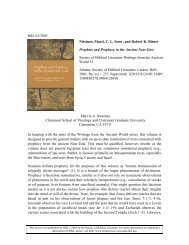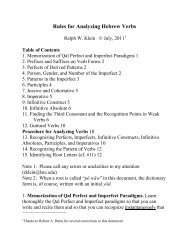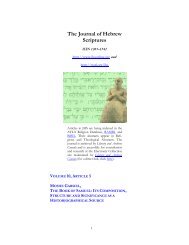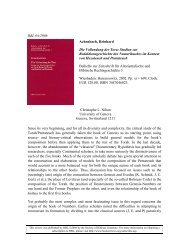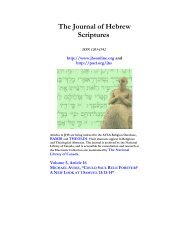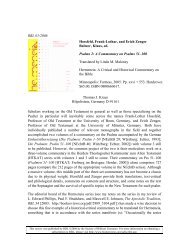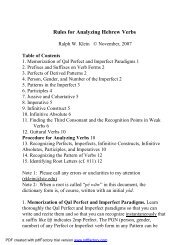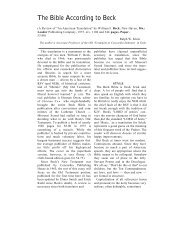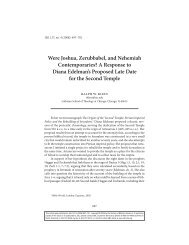A Liberated Lifestyle: Slaves and Servants in Biblical Perspective
A Liberated Lifestyle: Slaves and Servants in Biblical Perspective
A Liberated Lifestyle: Slaves and Servants in Biblical Perspective
Create successful ePaper yourself
Turn your PDF publications into a flip-book with our unique Google optimized e-Paper software.
A <strong>Liberated</strong> <strong>Lifestyle</strong>: <strong>Slaves</strong> <strong>and</strong> <strong>Servants</strong> <strong>in</strong><br />
<strong>Biblical</strong> <strong>Perspective</strong><br />
Ralph W. Kle<strong>in</strong><br />
Professor of the Old Testament, Christ Sem<strong>in</strong>ary — Sem<strong>in</strong>ex, St. Louis <strong>and</strong> editor of<br />
Currents <strong>in</strong> Theology <strong>and</strong> Mission<br />
Before I'd be a slave,<br />
I'd be buried <strong>in</strong> my grave,<br />
And go home to my Lord <strong>and</strong> be free.<br />
This passionate, Black cry for freedom<br />
f<strong>in</strong>ds warm reception today <strong>in</strong> the hearts of<br />
all people of good will. We hear its echo<br />
from the peasants of El Salvador <strong>and</strong> the<br />
Philipp<strong>in</strong>es, <strong>in</strong> the agoniz<strong>in</strong>g efforts of<br />
Solidarity <strong>in</strong> Pol<strong>and</strong>, <strong>and</strong> <strong>in</strong> the voices of<br />
women <strong>in</strong> home, church, <strong>and</strong> society, who<br />
rem<strong>in</strong>d us of the oppressive sexual<br />
hierarchy that persists even at the end of<br />
the second Christian millennium.<br />
Some of these freedom movements are<br />
peculiarly modern — the Bible knows<br />
noth<strong>in</strong>g of Northern Europe, let alone the<br />
Americas or the Far East. The women's<br />
movement is a Spirit-guided movement<br />
beyond the Bible, or, at the least, a<br />
development of egalitarian stra<strong>in</strong>s that<br />
existed only <strong>in</strong> germ<strong>in</strong>al form <strong>in</strong> biblical<br />
times. But this should not bl<strong>in</strong>d us to the<br />
fact that our biblical fore-bears felt<br />
passionately about freedom, their own <strong>and</strong><br />
that of others, <strong>and</strong> that <strong>in</strong> both Testaments<br />
acts of liberation form the burn<strong>in</strong>g center of<br />
what the Promise is all about.<br />
The Old Testament has much to say<br />
about those who have been freed, about<br />
their rights <strong>and</strong> responsibilities, their<br />
identity <strong>and</strong> their possibilities. While the<br />
Old Testament uses one word `ebed for<br />
both slave <strong>and</strong> servant, it radically<br />
differentiates between these words, with<br />
negative connotations when it refers to<br />
slaves <strong>and</strong> positive connotations when it<br />
refers to servants. I will attempt to ground<br />
our desire to be free <strong>and</strong> our sup-port of<br />
freedom movements <strong>in</strong> the example of Old<br />
Testament society <strong>and</strong> <strong>in</strong> its central<br />
message. In addition, I will offer guidel<strong>in</strong>es<br />
for the liberated, drawn from the biblical<br />
portrait of what it means to be a servant.<br />
<strong>Slaves</strong><br />
Social action <strong>and</strong> reform are associated<br />
<strong>in</strong> the popular m<strong>in</strong>d with the prophets,<br />
though, actually, Israel's legal traditions<br />
offer far greater evidence for the spirit of<br />
reform. While the prophets were passionate<br />
advocates of the poor <strong>and</strong> op-pressed, they<br />
did not th<strong>in</strong>k the "system" was wrong.<br />
Rather, they were conservatives, call<strong>in</strong>g<br />
society back to a traditional morality. The<br />
laws <strong>in</strong> Israel <strong>and</strong> <strong>in</strong> the ancient Near East,<br />
however, were basically reform decrees;<br />
they could be modified as conditions <strong>in</strong><br />
society changed or as theological positions<br />
suggested new concerns. Israel's critical<br />
sensitivity to slavery is reflected <strong>in</strong> its<br />
laws.<br />
The Covenant Code (Exod 21:1-23:33),<br />
whose present form dates to the eleventh<br />
century B.C.E., beg<strong>in</strong>s with a law about<br />
slavery (Exod 21:2-6). The lesser priority<br />
given to the laws about slavery <strong>in</strong> the<br />
famous Code of Hammurabi, on the other<br />
h<strong>and</strong>, is shown by their relatively late<br />
position at numbers 278-282. The slavery<br />
discussed <strong>in</strong> the Covenant Code would<br />
have resulted
from poverty or from failure to pay off a<br />
debt. Such slavery was to be temporary<br />
servitude: a slave would only serve six<br />
years <strong>and</strong> go free <strong>in</strong> the seventh. In short,<br />
slavery was an emergency <strong>in</strong>stitution <strong>and</strong><br />
was only to be tolerated for a limited<br />
period of time for any <strong>in</strong>dividual. If that<br />
person should decide to volunteer for<br />
additional service — because he had<br />
married a slave woman dur<strong>in</strong>g his bondage<br />
<strong>and</strong> had children by her, or because he<br />
really loved his master — his ear was<br />
pierced with an awl <strong>and</strong> he became, by his<br />
own choice, a slave for life. In the<br />
rabb<strong>in</strong>ical work called the Tosephta, we<br />
f<strong>in</strong>d the follow<strong>in</strong>g sarcastic appraisal of<br />
such voluntary slavery: "The ear which<br />
heard at S<strong>in</strong>ai, 'You are my servants,' but<br />
nevertheless preferred subjection to men<br />
rather than God, deserves to be pierced."<br />
The Covenant Code also regulates<br />
physical punishment or <strong>in</strong>jury of slaves. If<br />
a master struck his male or female slave so<br />
that the slave died under the beat<strong>in</strong>g, the<br />
master himself would be "punished,"<br />
presumably with the death penalty. If the<br />
beaten slave first died a day or two later,<br />
this tragedy was viewed as un<strong>in</strong>tentional;<br />
the master would merely suffer the<br />
f<strong>in</strong>ancial loss of a slave (Exod 21:20-21).<br />
If a master would bl<strong>in</strong>d one of his slaves<br />
or knock out a tooth, the slave, whether<br />
male or female, would go free (Exod<br />
21:26-27). What is remark-able about<br />
these laws is that contemporary, extra<br />
biblical laws never mention damage<br />
caused by a master to his own<br />
LIBERATED LIFESTYLE 213<br />
slave. Presumably that was viewed as "his<br />
own bus<strong>in</strong>ess." The Code of Hammurabi<br />
<strong>and</strong> the Hittite Laws provide monetary<br />
penalties for damage to slaves belong<strong>in</strong>g to<br />
someone else, <strong>in</strong>clud<strong>in</strong>g bl<strong>in</strong>d<strong>in</strong>g of slaves<br />
<strong>and</strong> break<strong>in</strong>g their teeth. But damage to<br />
one's own slaves was apparently not subject<br />
to claim.<br />
Israel's slavery laws were also subject to<br />
periodic reform, as we see by compar<strong>in</strong>g<br />
early (Exod 21:7-11) <strong>and</strong> late (Deut 15:12-<br />
18) laws on the role of slave women. The<br />
earlier law provides no emancipation for a<br />
woman slave. She was considered the wife,<br />
or concub<strong>in</strong>e, of her owner <strong>and</strong> was not to<br />
be freed <strong>in</strong> the seventh year. Even<br />
accord<strong>in</strong>g to the early law, however, a slave<br />
wife was not to be treated as a prostitute. If<br />
the owner should take a second slave wife,<br />
he could not deprive the first of food,<br />
cloth<strong>in</strong>g, or conjugal rights.<br />
The Deuteronomic law, typically, is<br />
more humane. It provides freedom for both<br />
men <strong>and</strong> women <strong>in</strong> the seventh year, <strong>and</strong><br />
also enjo<strong>in</strong>s the master to pro-vide the freed<br />
slave liberally with a pre-sent of gra<strong>in</strong> <strong>and</strong><br />
w<strong>in</strong>e to ease reentry <strong>in</strong>-to society.<br />
Accord<strong>in</strong>g to the Hol<strong>in</strong>ess Code (Lev<br />
17-26), edited <strong>in</strong> late pre-exilic times,<br />
slavery was to be conf<strong>in</strong>ed to foreigners or<br />
sojourners. Hence, a fellow Israelite, "your<br />
brother," could not be treated as a slave.<br />
Hard times might force a fellow Israelite to<br />
offer himself for <strong>in</strong>voluntary employment,<br />
but this status was to be that of hired<br />
servant <strong>and</strong> even that would
214 LIBERATED LIFESTYLE<br />
end with the year of Jubilee. He <strong>and</strong> his<br />
children would then be freed to return to<br />
his family. We are not told how this<br />
idealistic law aga<strong>in</strong>st slavery was coord<strong>in</strong>ated<br />
with the laws of Exodus <strong>and</strong><br />
Deuteronomy, which permitted <strong>in</strong>ternal<br />
Israelite slavery. But the fact that the<br />
Pentateuchal canon conta<strong>in</strong>s such a ten -<br />
sion is evidence of a basically critical attitude<br />
toward slavery, at least <strong>in</strong> some<br />
circles, that can be a model for us as we<br />
confront the issue of political, sexual,<br />
social, or economic servitude.<br />
Israel as Freed <strong>Slaves</strong><br />
Basic to Israel's enlightened attitude<br />
toward slavery was its own sense of identity<br />
<strong>and</strong> self-consciousness. The Israelites<br />
had become a people as God led them out<br />
of Egypt. This country of orig<strong>in</strong> is further<br />
def<strong>in</strong>ed on 13 occasions as "the house of<br />
slaves." "We were slaves to Pharaoh <strong>in</strong><br />
Egypt," Israel confessed <strong>in</strong> Deut 6:21,<br />
<strong>and</strong>, once freed, they were promised by<br />
Yahweh that they would never have to<br />
return there aga<strong>in</strong> (Deut 17:16; 28:68).<br />
Perhaps, therefore, one of the most bitter<br />
curses threatened by Hosea was that<br />
<strong>in</strong>iquitous Israel would be forcibly<br />
returned to their former l<strong>and</strong> of bondage<br />
<strong>in</strong> Egypt (8:13; 9:3)<br />
In the Deuteronomic law code Israel's<br />
past slavery is used to motivate her present<br />
action. It was because of the Exodus<br />
from Egypt that Israel was to keep the<br />
Sabbath (Deut 5:15; the other version of<br />
the Decalogue, <strong>in</strong> Exod 20:8-11,<br />
grounded Sabbath-keep<strong>in</strong>g <strong>in</strong> the pat-tern<br />
established by Yahweh's six-day creation<br />
<strong>and</strong> his rest<strong>in</strong>g on the seventh day). The<br />
deuteronomic Decalogue en -jo<strong>in</strong>s the<br />
Sabbath so that "your manservant <strong>and</strong><br />
your maidservant may rest as well as you.<br />
You shall remember that you were a slave<br />
<strong>in</strong> the l<strong>and</strong> of Egypt, <strong>and</strong> Yahweh your<br />
God brought you out thence with a mighty<br />
h<strong>and</strong> <strong>and</strong> an out-stretched arm; therefore,<br />
Yahweh your God comm<strong>and</strong>ed you to<br />
keep the Sab bath Day." (Deut 6:14-15)<br />
Israel knew what it meant to be a slave,<br />
<strong>and</strong> this knowledge suggested a k<strong>in</strong>d<br />
treatment of her own servants.<br />
The custom of provid<strong>in</strong>g freed slaves<br />
with presents to ease their way back <strong>in</strong>to<br />
society (Deut 15:15, discussed above) was<br />
based on the memory of past servitude <strong>and</strong><br />
past redemption at God's h<strong>and</strong>. "As<br />
Yahweh has blessed you, you shall give to<br />
the freed slave." (Deut 15:14-15) At the<br />
great feast of Weeks (Pentecost), a banquet<br />
was to be eaten <strong>in</strong> the sanctuary to which<br />
all sorts of disadvantaged were to be<br />
<strong>in</strong>vited — your manservant <strong>and</strong><br />
maidservant, the Levite who is with<strong>in</strong> your<br />
towns, the sojourner, the fatherless, <strong>and</strong><br />
the widow. "You shall remember that you<br />
were a slave <strong>in</strong> Egypt; <strong>and</strong> you shall be<br />
careful to observe these statutes ." (Deut<br />
16:12) F<strong>in</strong>ally, Israel's emancipation from<br />
Egypt was the theological rationale for not<br />
pervert<strong>in</strong>g the justice due to the sojourner,<br />
the fatherless, <strong>and</strong> the widow (Deut<br />
24:18), <strong>and</strong> for not glean<strong>in</strong>g the
grapes, so that there would be enough left<br />
on the v<strong>in</strong>e for the poor to help themselves<br />
(Deut 24:22).<br />
<strong>Servants</strong><br />
What a strange <strong>and</strong> wonderful irony that<br />
the same Hebrew word used for Israel's<br />
<strong>in</strong>glorious <strong>and</strong> detested past as slaves<br />
('ebed) would become the vocable for<br />
describ<strong>in</strong>g her glorious status as servants .<br />
Israel was liberated <strong>in</strong>to perfect servitude.<br />
This new condition deserves exploration<br />
for its own sake <strong>and</strong> for the lessons it offers<br />
contemporary children of God.<br />
Status<br />
Her new status resulted from God's<br />
actions. Israel could not celebrate a cha<strong>in</strong><br />
of human liberators, who had rallied the<br />
people dur<strong>in</strong>g their bondage. Even Moses,<br />
as the Yahwist remembered him, ascribed<br />
the credit totally to God's <strong>in</strong>tervention:<br />
"Fear not, st<strong>and</strong> firm, <strong>and</strong> see the salvation<br />
of Yahweh, which he will perform for you<br />
today; for the Egyptians whom you see<br />
today, you shall never see aga<strong>in</strong>. Yahweh<br />
will fight for you, <strong>and</strong> you have only to be<br />
still." (Exod 14:13-14) The <strong>in</strong>troduction to<br />
the Decalogue clarifies what is unique<br />
about the follow<strong>in</strong>g comm<strong>and</strong>ments. They<br />
were given by a God who made Israel what<br />
she was : "I am Yahweh your God, who<br />
brought you out of the l<strong>and</strong> of Egypt, out of<br />
the house of slaves ." (Exod 20:2)<br />
LIBERATED LIFESTYLE 215<br />
It is perhaps necessary for us to under-score<br />
the transcendent character of God's action<br />
here. Marxist philosopher Ernst Bloch has<br />
def<strong>in</strong>ed God as the Exodus event, <strong>and</strong><br />
American sociological exegete Norman<br />
Gottwald similarly def<strong>in</strong>es Yahweh as the<br />
historically concretized, primordial power<br />
to establish <strong>and</strong> susta<strong>in</strong> social equality <strong>in</strong><br />
the face of counter oppression, or as the<br />
symbol of a s<strong>in</strong>gle-m<strong>in</strong>ded pursuit of an<br />
egalitarian tribal social system. Yahweh is<br />
not such an ideology. Rather, he was the<br />
almighty one who freed Israel <strong>and</strong> who was<br />
alone responsible for the status she<br />
enjoyed. Status did not result from self<br />
achievements, nor was the status itself the<br />
achievement.<br />
God's honored servants <strong>in</strong>clude even<br />
foreigners who jo<strong>in</strong> themselves to Yahweh<br />
<strong>and</strong> who love his name; God's temple will<br />
be a house of prayer for them <strong>and</strong> for all<br />
peoples (Isa 56:6-7). God's honored<br />
servants are those chosen by him (Isa 65:8-<br />
9); his choice <strong>and</strong> not their efforts gives<br />
them status. The contrast between God's<br />
favored servants <strong>and</strong> those who oppose him<br />
is brought out dramatically <strong>in</strong> the follow<strong>in</strong>g<br />
polemical passage, where the "you" are<br />
God's enemies while the "servants" are his<br />
pious followers:<br />
Behold, my servants shall eat,<br />
but you shall be hungry;<br />
behold, my servants shall dr<strong>in</strong>k,<br />
but you shall be thirsty;<br />
behold, my servants shall rejoice,<br />
but you shall be put to shame;
216 LIBERATED LIFESTYLE<br />
behold, my servants shall s<strong>in</strong>g for<br />
gladness of heart,<br />
but you shall cry out for pa<strong>in</strong> of<br />
heart,<br />
<strong>and</strong> shall wail for anguish of spirit.<br />
(Isa 65:13-14)<br />
Who are the servants? They are the ones<br />
whom Yahweh's h<strong>and</strong> supports. Who are<br />
his enemies? Those who are under his<br />
<strong>in</strong>dignation (Isa 66:14).<br />
The word "servant" came to connote the<br />
trust of a worshiper. So the psalmist prays:<br />
Preserve my life, for I am godly, save your<br />
servant, who trusts <strong>in</strong> you<br />
(Ps 86:2)<br />
The new status of servant does not mean<br />
fawn<strong>in</strong>g subservience, but belong<strong>in</strong>g <strong>and</strong><br />
protection under God's care. This hopeful<br />
dependency is perhaps best ex-pressed <strong>in</strong> a<br />
somewhat unfamiliar Communal Lament:<br />
Behold, as the eyes of servants look to<br />
the h<strong>and</strong> of their master,<br />
as the eyes of a maid to the h<strong>and</strong> of<br />
her mistress,<br />
so our eyes look to Yahweh our God, till<br />
he have mercy upon us.<br />
Have mercy upon us, Yahweh . . . for<br />
we have had more than<br />
enough of contempt. (Ps 123:2-3)<br />
"I am your servant/we are your servants"<br />
— what joyful, confident, liberated trust<br />
resides <strong>in</strong> these words!<br />
<strong>Servants</strong> Serve<br />
Still, be<strong>in</strong>g a servant is not merely a<br />
rank; it is also the act of serv<strong>in</strong>g Yahweh<br />
the liberator. The <strong>in</strong>troductory formula we<br />
noted above, "I am Yahweh your God,<br />
who brought you out of the l<strong>and</strong> of Egypt,<br />
out of the house of slaves," is followed by<br />
"You shall have no other gods," <strong>and</strong> by the<br />
rest of the Decalogue. Such service is not<br />
nom<strong>in</strong>al or optional, but <strong>in</strong>volves the<br />
entire existence of the servant. It was not<br />
for noth<strong>in</strong>g that the Deuteronomist urged<br />
Israel to serve Yahweh "with all your heart<br />
<strong>and</strong> soul" by keep<strong>in</strong>g the comm<strong>and</strong>ments<br />
<strong>and</strong> statutes conta<strong>in</strong>ed <strong>in</strong> Deuteronomy . In<br />
Jeremiah's new covenant passage (Jer<br />
31:31-34), itself under heavy<br />
deuteronomistic <strong>in</strong> fluence, we read that<br />
service of or knowledge of God will not be<br />
an option, a k<strong>in</strong>d of elective by which the<br />
believer enriches his or her life program.<br />
Rather, such obedience will be <strong>in</strong>delibly<br />
<strong>in</strong>-scribed on the hearts of the servants . To<br />
claim the status of servant without a<br />
commitment to serve is an utter <strong>and</strong> <strong>in</strong>tolerable<br />
contradiction.<br />
The opposite of serv<strong>in</strong>g God is not no<br />
service. Rather, the opposite of serv<strong>in</strong>g<br />
Yahweh is serv<strong>in</strong>g other gods, as the<br />
deuteronomistic literature never tires of<br />
repeat<strong>in</strong>g. Serv<strong>in</strong>g other gods means not<br />
only participation <strong>in</strong> foreign cults, but also<br />
recogniz<strong>in</strong>g their lordship. To serve other<br />
gods is to reject the first comm<strong>and</strong>ment.<br />
Every s<strong>in</strong> is, f<strong>in</strong>ally <strong>and</strong> at its
oots, a rejection of the first comm<strong>and</strong>ment.<br />
While serv<strong>in</strong>g God can denote worship<br />
(Gottesdienst), it cannot ever re-place<br />
obedient serv<strong>in</strong>g of God <strong>in</strong> all of life (Gott<br />
dienen). The servants addressed <strong>in</strong> Micah<br />
6 are rem<strong>in</strong>ded that they have been freed<br />
from the house of slaves, given faithful<br />
leaders like Moses, Aaron, <strong>and</strong> Miriam,<br />
<strong>and</strong> that they were blessed through Balaam<br />
as God led their fore-bears from Shittim to<br />
Gilgal as part of the conquest. How are<br />
such sav<strong>in</strong>g acts, or righteous deeds, of<br />
Yahweh to be re-paid? With burnt<br />
offer<strong>in</strong>gs or yearl<strong>in</strong>g calves? With ten<br />
thous<strong>and</strong> rams or my riad libations of oil?<br />
With the sacrifice of an eldest child <strong>in</strong> a<br />
desperate quest for forgiveness? (Micah<br />
6:6-7) The prophet's famous answer has<br />
become proverbial:<br />
He has showed you, mank<strong>in</strong>d,<br />
what is good;<br />
<strong>and</strong> what does Yahweh<br />
dem<strong>and</strong> of you<br />
but to do justice,<br />
<strong>and</strong> to love k<strong>in</strong>dness,<br />
<strong>and</strong> to walk humbly with your<br />
God? (Micah 6:8)<br />
Do<strong>in</strong>g justice would seem to be the<br />
broadest def<strong>in</strong>ition of service, of which<br />
lov<strong>in</strong>g mercy is a part. Those who love<br />
mercy see the claim of the helpless as an<br />
obligation laid on their conduct; they<br />
acknowledge the needy as brothers <strong>and</strong><br />
sisters. Humble walk<strong>in</strong>g with God has<br />
sometimes been an excuse for <strong>in</strong>action or<br />
LIBERATED LIFESTYLE 217<br />
even for self-deprecation. Instead of such<br />
"humble walk<strong>in</strong>g," the Hebrew suggests a<br />
walk<strong>in</strong>g or a conduct that flows from a<br />
clear <strong>and</strong> sober judgment of the<br />
circumstances that prevail. Those who have<br />
<strong>in</strong>sight <strong>in</strong>to what God has done — at the<br />
Exodus, <strong>in</strong> his on-go<strong>in</strong>g provision of<br />
leadership, <strong>in</strong> the conquest — will re spond<br />
wisely <strong>and</strong> appropriately. In other words,<br />
humble walk<strong>in</strong>g is only another way of<br />
say<strong>in</strong>g that such people will seek justice<br />
<strong>and</strong> recognize the claim of the needy upon<br />
them. That's what Yahweh requires of his<br />
servants .<br />
The Servant(s) of God<br />
A number of <strong>in</strong>dividuals are called the<br />
servant of God as they participate <strong>in</strong> God's<br />
work on <strong>and</strong> for his people Israel.<br />
Abraham, Isaac, Jacob, Job, <strong>and</strong> David are<br />
such servants . In the Deuteronomis tic<br />
History (Joshua — 2 K<strong>in</strong>gs) the prophets<br />
are often called, " my servants, the<br />
prophets ." In a time of grow<strong>in</strong>g apostasy<br />
they rema<strong>in</strong>ed true to Yahweh <strong>and</strong><br />
performed his service. Moses is called the<br />
servant of God some 40 times. At times his<br />
servanthood denotes his high rank, much<br />
like that of the highest <strong>and</strong> most faithful<br />
servants of a k<strong>in</strong>g (e.g., 1 Sam 27:5, 12; 2<br />
Sam 15:21). With most prophets Yahweh<br />
spoke <strong>in</strong> a vision or <strong>in</strong> a dream. "Not so<br />
with my servant Moses; he is entrusted<br />
with all my house. With him I speak mouth<br />
to mouth, clearly; <strong>and</strong> not <strong>in</strong> dark speech. . .<br />
. " (Num 12:7-8)
218 LIBERATED LIFESTYLE<br />
In the priestly stratum of the Pentateuch,<br />
the death of Moses was due to his rebellion<br />
<strong>in</strong> the wilderness of Z<strong>in</strong> (Num 27:14; cf.<br />
20:12). But <strong>in</strong> the Deuteronomistic History,<br />
Moses' death is given salvific significance.<br />
He dies <strong>in</strong> the place of the people:<br />
"Yahweh was angry with me on account of<br />
you, <strong>and</strong> said, 'You also shall not go <strong>in</strong><br />
there."' (= the l<strong>and</strong> Deut 1:37) When<br />
Moses, the servant of Yahweh, later prays<br />
that he might enter the l<strong>and</strong> (Deut 3:24-25),<br />
Yahweh aga<strong>in</strong> decl<strong>in</strong>es: "Let it suffice you;<br />
speak no more to me of this matter." As<br />
Moses re-ports, "Yahweh was angry with<br />
me on your account." (Deut 3:26)<br />
The servant role of Moses, by which he<br />
bore the punishment <strong>in</strong>tended for Israel, is<br />
generalized <strong>and</strong> developed <strong>in</strong> the role of the<br />
Servant of Yahweh <strong>in</strong> Second Isaiah (Isa<br />
40-55). The orig<strong>in</strong>al identity of this servant,<br />
now as before, rema<strong>in</strong>s under dispute<br />
though the options have now been<br />
restricted to Israel as the servant or to the<br />
prophet himself as the servant, or, as I<br />
would prefer, to a comb<strong>in</strong>ation of these<br />
ideas: the servant is Israel, but certa<strong>in</strong><br />
aspects of the servant's description are<br />
shaped by reflections upon the career of<br />
Second Isaiah.<br />
In the first servant poem, Isa 42:1-4,<br />
Yahweh presents his servant before an<br />
unnamed audience, possibly to be identified<br />
with the Div<strong>in</strong>e Council. Gifted with<br />
the spirit, like the judges, the early k<strong>in</strong>gs, or<br />
the prophets, the servant is to carry out the<br />
royal task of effect<strong>in</strong>g justice for the<br />
nations. Pastorally k<strong>in</strong>d <strong>and</strong><br />
gentle <strong>in</strong> his deal<strong>in</strong>gs, he will successfully<br />
implement justice until God's faithfulness<br />
is known among the nations. Though the<br />
servant (read: prophet or faithful Israel)<br />
will experience rejection <strong>and</strong> resistance<br />
fro m the fellow Israelites, he will persist<br />
<strong>and</strong> hold fast as he establishes the rule of<br />
Yahweh <strong>and</strong> his law for all the nations. As<br />
Yahweh seeks Israel through the servant,<br />
he is at the same time seek<strong>in</strong>g the nations.<br />
Isa 49:1-6 is a speech of the servant <strong>in</strong><br />
which he reports his own sense of vocation.<br />
God chose his servant before his birth<br />
— one does not decide to be God's servant<br />
or claim any credit for service. The chosen<br />
servant is Yahweh's secret weapon though<br />
the form of this weapon is a mouth that<br />
speaks God's word <strong>in</strong>-stead of a destructive<br />
weapon of war. As prophetic mouth, the<br />
servant is God's last <strong>and</strong> greatest plan for<br />
the world. Like any pious servant, he is<br />
hidden away under the deity's protection.<br />
The present failure of the servant ("I have<br />
labored <strong>in</strong> va<strong>in</strong>, I have spent my strength<br />
for noth<strong>in</strong>g <strong>and</strong> vanity." Isa 49:4) is<br />
balanced by the promise of <strong>and</strong> the hope <strong>in</strong><br />
eventual success: "My right is with<br />
Yahweh; my pay will come from God."<br />
(Isa 49:4) His present lack of success<br />
results from at-tacks by those whom he is<br />
seek<strong>in</strong>g to w<strong>in</strong> for Yahweh. Hence, his<br />
lack of success is related to Yahweh's lack<br />
of success, <strong>and</strong> the latter's eventual victory<br />
will br<strong>in</strong>g with it the servant's reward.<br />
Yahweh's eventual success means not only<br />
that his message will get through to<br />
recalcitrant
Israel, but that the servant will be appo<strong>in</strong>ted<br />
as light to the nations, so that God's<br />
salvation may reach to the end of the earth<br />
(Isa 49:6).<br />
The third Servant poem (Isa 50:4-9) is a<br />
psalm of confidence. In verse 4 the servant<br />
tells how Yahweh gave him a tongue <strong>and</strong><br />
an ear, the guarantee that he would know<br />
the right word to speak to God's exhausted<br />
people. The servant, mean-while, has not<br />
been turned aside by rejection <strong>and</strong> even<br />
physical abuse — they smote him, pulled<br />
out the hair of his beard, <strong>and</strong> spit upon him.<br />
No, the servant rema<strong>in</strong>s the servant, not a<br />
rebel or a quitter. Why? Because lord<br />
Yahweh helped him. One is always a<br />
servant be-cause of God's action (see<br />
above), <strong>and</strong> a servant responds to such aid<br />
with utter confidence: "I have not been<br />
con-founded; I have set my face like a<br />
fl<strong>in</strong>t; I know that I shall not be put to<br />
shame; the one who v<strong>in</strong>dicates me is near."<br />
(Isa 50:7-8) The servant st<strong>and</strong>s up to<br />
attacks <strong>and</strong> eventually receives v<strong>in</strong>dication<br />
because of lord Yahweh. The question is<br />
not only, or not really, "Will the servant<br />
succeed?" Rather, the question is, "Will<br />
Yahweh's cause prevail?" And s<strong>in</strong>ce it will,<br />
the servant acts <strong>in</strong> confidence <strong>and</strong> hope.<br />
The fourth servant poem (Isa 52:13-<br />
53:12) is sometimes difficult <strong>in</strong> detail to<br />
underst<strong>and</strong>, but it is, by any reckon<strong>in</strong>g, the<br />
most profound. It beg<strong>in</strong>s, as <strong>in</strong> 42:1, with<br />
Yahweh hail<strong>in</strong>g his servant: he will be<br />
successful <strong>and</strong> he will re ceive honor<br />
(52:13). His exaltation, how-<br />
LIBERATED LIFESTYLE 219<br />
ever, is highlighted aga<strong>in</strong>st the backdrop of<br />
humiliation <strong>and</strong> failure (52:14; 53:2-3).<br />
The servant's com<strong>in</strong>g victory, which<br />
echoes Yahweh's own victory, will take<br />
place with all the nations as witnesses<br />
(52:15). The despised <strong>and</strong> rejected servant<br />
was not really despicable himself. He<br />
suffered because of <strong>and</strong> <strong>in</strong> the place of the<br />
griefs <strong>and</strong> sorrows due to those who<br />
opposed him. Instead of be<strong>in</strong>g under God's<br />
punishment, he bore the transgressions <strong>and</strong><br />
<strong>in</strong>iquities of his enemies. What a strange<br />
economy : the servant's punishment meant<br />
heal<strong>in</strong>g for his opponents . The turn <strong>in</strong> the<br />
servant's fate, as he sees his offspr<strong>in</strong>g <strong>and</strong><br />
prolongs his days, is matched by a turn <strong>in</strong><br />
the fate of the whole world. The servant<br />
br<strong>in</strong>gs recalcitrant Israel <strong>and</strong>/or the nations<br />
to Yahweh with his substitutionary death.<br />
As a reward, he will be jo<strong>in</strong>ed with all<br />
Israel (= the many), <strong>and</strong> together they will<br />
count up their booty, namely, the salvation<br />
of the Gentiles.<br />
Yahweh reaches out to recalcitrant<br />
Israel <strong>and</strong> to the nations through the word<br />
<strong>and</strong> vicarious suffer<strong>in</strong>g of his servant.<br />
Yahweh's plan succeeds, <strong>in</strong> that through<br />
the servant all return to him.<br />
The highlights of the servant poems bear<br />
repeat<strong>in</strong>g. God's servant is under his<br />
special care <strong>and</strong> assigned a special mission.<br />
His mission is the prophetic one of<br />
convey<strong>in</strong>g God's word to Israel <strong>and</strong> the<br />
nations, <strong>in</strong> spite of rejection <strong>and</strong> abuse at<br />
their h<strong>and</strong>s. Yet, Yahweh's seek<strong>in</strong>g of<br />
Israel <strong>and</strong> the nations is promised ultimate<br />
success, partly because the
220 LIBERATED LIFESTYLE<br />
servant endures the punishment meant for<br />
the enemies of Yahweh. The servant seeks<br />
justice like a k<strong>in</strong>g; he announces the word<br />
<strong>and</strong> suffers like a prophet. His life is the<br />
paradigm of the liberated lifestyle.<br />
How does this vocation of servant harmonize<br />
with the message of Second Isaiah<br />
elsewhere? The prophet announced to<br />
exilic Israel a great new Exodus <strong>and</strong> a trip<br />
home to Zion, an announcement<br />
undergirded by references to Yahweh as<br />
Creator <strong>and</strong> Redeemer. Yahweh was able<br />
<strong>and</strong> will<strong>in</strong>g to save. This good <strong>and</strong> joyful<br />
news was promised by God <strong>in</strong> accord with<br />
his freedom. In his freedom he could use<br />
the Persian Cyrus as his special agent; he<br />
could offer to the oppressive nations both<br />
defeat <strong>and</strong> an opportunity to recognize<br />
whose was the real glory <strong>in</strong> the world. At<br />
the beg<strong>in</strong>n<strong>in</strong>g <strong>and</strong> end of his book, Second<br />
Isaiah based his proclamation on the word<br />
or promise of God proclaimed to weak <strong>and</strong><br />
weary Israel.<br />
As Israel waited for this word to happen,<br />
she was <strong>in</strong>vited to conduct herself as<br />
God's servant. Her faithful endurance of<br />
exile, despite her rejection by God's<br />
opponents <strong>and</strong> her victorious accomplishment<br />
of God's task, were designed to<br />
make her a light to the nations. That<br />
exalted, but realistic servant role rema<strong>in</strong>s<br />
the vocation of God's people until this day.<br />
Still, another way <strong>in</strong> which the servant<br />
poems <strong>in</strong>tersect with the rest of Second<br />
Isaiah's message is exemplified <strong>in</strong> Isa<br />
43:22-28, a Trial Speech aga<strong>in</strong>st Israel.<br />
This speech seems to presuppose a compla<strong>in</strong>t<br />
of Israel, that ran somewhat as follows:<br />
"How could you act this way Yahweh,<br />
whereas we served you faithfully?"<br />
Yahweh responded by deny<strong>in</strong>g that he had<br />
made Israel serve (RSV: "I have not<br />
burdened you") with all k<strong>in</strong>ds of sacrifices.<br />
Instead, Israel made Yahweh serve (RSV:<br />
"You have burdened me") with their s<strong>in</strong>s<br />
<strong>and</strong> <strong>in</strong>iquities. While Israel's s<strong>in</strong>s were no<br />
doubt a "burden" <strong>and</strong> a "wear<strong>in</strong>ess" for<br />
Yahweh, this conventional underst<strong>and</strong><strong>in</strong>g<br />
misses a most important feature of the<br />
passage. Israel's s<strong>in</strong>s <strong>and</strong> <strong>in</strong>iquities also<br />
turned Yahweh <strong>in</strong>to a servant, <strong>and</strong> he, like<br />
the servant of the servant poems, would<br />
make himself an offer<strong>in</strong>g for s<strong>in</strong> <strong>and</strong> would<br />
make them be accounted righteous. If the<br />
earthly servant by his patient bear<strong>in</strong>g of<br />
rebuke helps Yahweh's salvation to reach to<br />
the ends of the earth, how much more will<br />
the patient bear<strong>in</strong>g of rebuke by the<br />
heavenly servant be a light <strong>and</strong> a covenant<br />
to the nations.<br />
The church — early <strong>and</strong> late — has seen<br />
<strong>in</strong> the servant a model <strong>and</strong> para digm for<br />
underst<strong>and</strong><strong>in</strong>g the work of Jesus Christ. He<br />
is the servant par excellence; he served that<br />
we might serve. His servants have a new<br />
status given to them by promise. His<br />
servants are not crushed or subservient, but<br />
they belong to, <strong>and</strong> f<strong>in</strong>d protection with,<br />
their Lord. His servants obey, a service of<br />
heart <strong>and</strong> soul <strong>and</strong> m<strong>in</strong>d. His servants seek<br />
to <strong>in</strong>stall God's justice <strong>in</strong> the world <strong>and</strong> to<br />
walk shrewdly <strong>in</strong> light of their<br />
Emancipator's
ways. His servants participate <strong>in</strong> God's<br />
work for his people right now. They imitate<br />
the self-giv<strong>in</strong>g service of the Greatest<br />
Servant of all <strong>in</strong> their daily lives.<br />
God's freed-up servants would never<br />
aga<strong>in</strong> want to be slaves. They also know<br />
that they do not have to go home to their<br />
Lord to be free. Self-giv<strong>in</strong>g service right<br />
now is the shape of the liberated life-style.<br />
How Does All This Apply?<br />
<strong>Biblical</strong> images can lose their power<br />
through too much familiarity or too much<br />
sentimentality — the Good Shepherd is<br />
perhaps the best example . Or biblical<br />
images fade because contemporary<br />
Christians no longer have a clear or usable<br />
picture of what the orig<strong>in</strong>al image implied.<br />
God as Father or K<strong>in</strong>g may sound too<br />
"mascul<strong>in</strong>e" today, or it may imply facets<br />
of fatherhood <strong>and</strong> k<strong>in</strong>gship that are only<br />
negative <strong>in</strong> our personal or corporate<br />
experience. Yet, if we choose not to use<br />
such images because they seem archaic or<br />
their connotations counterproductive, we<br />
often lose what those images were once<br />
designed to convey.<br />
So it is with the Christian as servant.<br />
Western Christians may th<strong>in</strong>k only of a<br />
long-departed elitist society when they hear<br />
talk about be<strong>in</strong>g a servant. Or the<br />
LIBERATED LIFESTYLE 221<br />
notion of servants may suggest that of<br />
slaves <strong>and</strong> rem<strong>in</strong>d only of the shameful<br />
history of Black slavery <strong>in</strong> America. To<br />
some Liberation theologians servanthood<br />
automatically implies non-assertiveness,<br />
yield<strong>in</strong>g to the status quo, a non-liberated<br />
anthropology. Small wonder that a study of<br />
slaves <strong>and</strong> servants seems quite unmodern.<br />
Slavery, non-assertiveness, <strong>and</strong> yield<strong>in</strong>g<br />
to the status quo are all h<strong>in</strong>drances to our<br />
underst<strong>and</strong><strong>in</strong>g of what the new life <strong>in</strong><br />
Christ is all about. But to fail to ponder<br />
what it means to be emancipated slaves <strong>and</strong><br />
new-style servants would mean miss<strong>in</strong>g a<br />
great deal of the Chris tian perspective on<br />
the human condition. I wrote this paper<br />
becuse I perceived that today's criticism of<br />
slavery <strong>and</strong> servanthood often throws out<br />
the baby with the bath.<br />
We may not at first like servant talk, but<br />
the Christian Gospel leaves us little choice.<br />
Luther spoke of our freedom, our be<strong>in</strong>g<br />
subject to no one, but <strong>in</strong>sisted that at the<br />
same time we are slaves <strong>and</strong> servants,<br />
subject to everyone. To bear proudly the<br />
status of servant <strong>and</strong> to serve to the<br />
uttermost are, f<strong>in</strong>ally, the marks of a<br />
liberated person. All hail to God the<br />
Liberator! All joy to his obedient daughters<br />
<strong>and</strong> sons, who serve because they are free.


